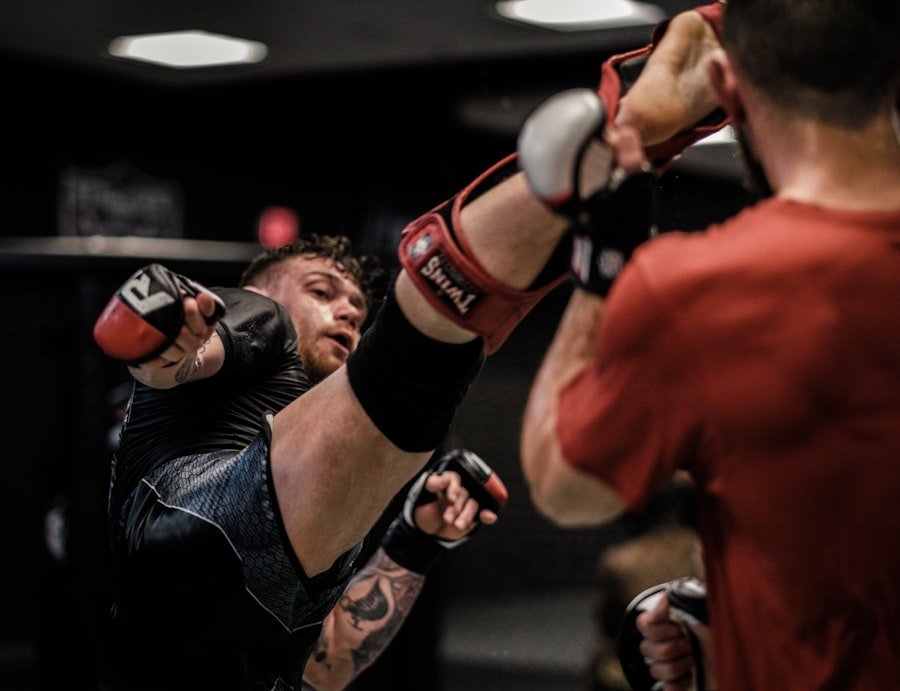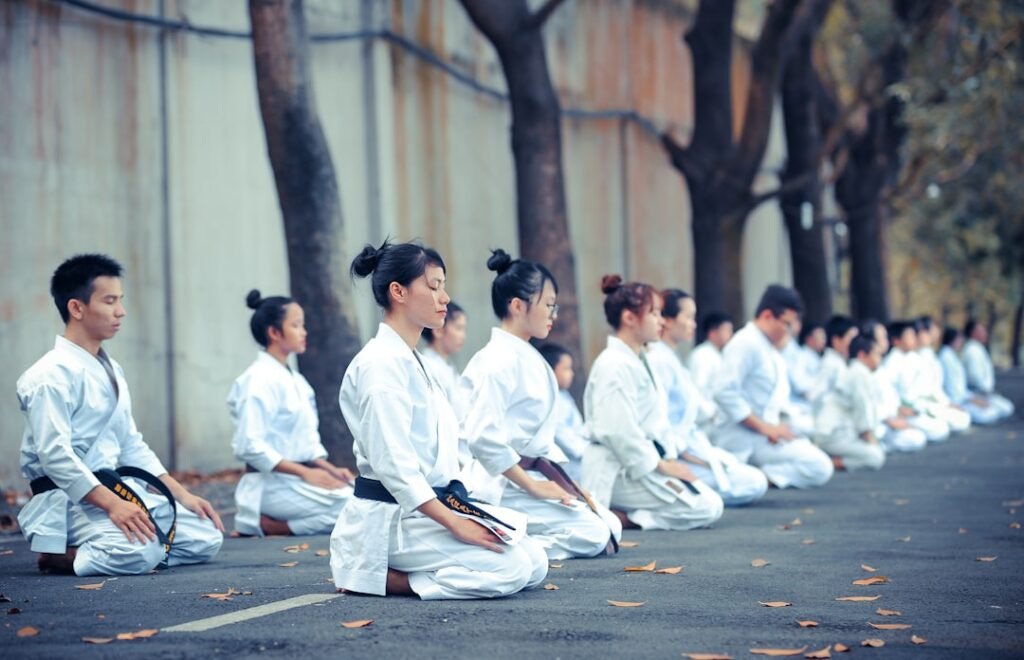In the vibrant city of Oslo, where martial arts enthusiasts gather to hone their skills, the benefits of learning Mandarin extend far beyond mere language acquisition. For martial artists, mastering Mandarin can serve as a bridge to a deeper understanding of the philosophies and techniques that underpin their practice. The roots of many martial arts styles can be traced back to China, where the language is not just a means of communication but also a vessel for cultural heritage and wisdom.
By learning Mandarin, martial artists in Oslo can access a wealth of knowledge that is often lost in translation, allowing them to connect more profoundly with the traditions and teachings of their art. Moreover, the ability to converse in Mandarin opens up opportunities for martial artists to engage with practitioners from around the world. Whether attending seminars, competitions, or training camps in China or elsewhere, having a grasp of the language can enhance interactions and foster camaraderie among fellow martial artists.
This linguistic skill not only enriches the training experience but also cultivates a sense of belonging within the global martial arts community. In essence, learning Mandarin equips Oslo’s martial artists with tools that enhance their practice and broaden their horizons. Spaces are filling up fast! Register for Chinese classes at the LC Chinese School in Oslo today.
Table of Contents
ToggleSummary
- Learning Mandarin can enhance cultural understanding and communication in martial arts training in Oslo.
- Mandarin can improve mental focus and concentration, leading to better performance in martial arts.
- The connection between Mandarin and traditional martial arts can deepen understanding and appreciation of the art form.
- Incorporating Mandarin into martial arts training in Oslo can enhance physical coordination and technique.
- Combining Mandarin and martial arts practice can lead to long-term benefits, including improved discipline and patience.
How Mandarin Can Improve Mental Focus and Concentration
The journey of mastering martial arts is as much about mental discipline as it is about physical prowess. Learning Mandarin can significantly bolster mental focus and concentration, essential attributes for any martial artist. The intricacies of the language—its tones, characters, and grammatical structures—demand a high level of cognitive engagement.
As students immerse themselves in Mandarin, they train their brains to process complex information, enhancing their overall mental acuity. This heightened focus translates seamlessly into martial arts training, where concentration is paramount for executing techniques with precision and clarity. Furthermore, the practice of learning Mandarin encourages mindfulness, a quality that is invaluable in martial arts.
As students grapple with new vocabulary and sentence structures, they cultivate an awareness of their thought processes and learning patterns. This self-awareness fosters a meditative state that can be beneficial during training sessions, allowing martial artists to remain present and fully engaged in their practice. By integrating Mandarin into their routine, Oslo’s martial artists can sharpen their mental faculties, ultimately leading to improved performance on the mat.
The Connection Between Mandarin and Traditional Martial Arts

The relationship between Mandarin and traditional martial arts is deeply intertwined, with language serving as a conduit for understanding the rich history and philosophy behind various styles. Many martial arts terms and concepts are rooted in Chinese culture, making proficiency in Mandarin essential for grasping the nuances of these practices. For instance, terms like “qi” (energy) and “yin-yang” (balance) are fundamental to many martial arts philosophies and are best understood within their cultural context.
By learning Mandarin, martial artists in Oslo can delve into these concepts more profoundly, enriching their training experience. Additionally, many traditional martial arts schools in China emphasise the importance of language in their teachings. Instruction often includes not only physical techniques but also philosophical discussions that are steeped in Chinese culture.
By understanding Mandarin, Oslo’s martial artists can engage more meaningfully with these teachings, gaining insights that may otherwise remain elusive. This connection between language and martial arts fosters a holistic approach to training, where physical skills are complemented by a deep appreciation for the art’s cultural heritage.
The Role of Language in Cultivating Discipline and Patience
Discipline and patience are cornerstones of both language learning and martial arts practice. The process of mastering Mandarin requires consistent effort and dedication, mirroring the commitment needed to excel in martial arts. As students navigate the complexities of the language—grappling with tones, characters, and syntax—they develop a sense of perseverance that is directly applicable to their training.
This shared journey fosters resilience, teaching martial artists in Oslo that progress comes with time and effort. Moreover, the act of learning a new language cultivates patience as students encounter challenges along the way. Just as mastering a difficult technique in martial arts requires repeated practice and refinement, so too does acquiring fluency in Mandarin demand time and persistence.
This parallel reinforces the idea that both disciplines require a long-term commitment to growth. By embracing the challenges of language learning alongside their martial arts training, practitioners can develop a mindset that values patience and discipline—qualities that will serve them well both on and off the mat.
How Learning Mandarin Can Enhance Cultural Understanding in Martial Arts
Cultural understanding is an integral aspect of martial arts practice, particularly for those who wish to honour the traditions from which their art originates. Learning Mandarin provides Oslo’s martial artists with a unique opportunity to immerse themselves in Chinese culture, gaining insights that enhance their appreciation for the art form. Language is a reflection of culture; thus, by studying Mandarin, practitioners can better understand the values, beliefs, and historical contexts that shape their martial arts journey.
Furthermore, engaging with Chinese literature, philosophy, and folklore through the lens of Mandarin allows martial artists to connect with the stories and teachings that have influenced their practice for centuries. This cultural immersion fosters a sense of respect for the origins of their art and encourages practitioners to carry forward its traditions with integrity. In this way, learning Mandarin becomes not just an academic pursuit but a means of deepening one’s connection to the rich tapestry of martial arts history.
The Impact of Mandarin on Physical Coordination and Technique

The physicality of martial arts is complemented by the cognitive demands of learning a new language like Mandarin. As students engage with both disciplines simultaneously, they may find that their physical coordination improves alongside their linguistic skills. The process of learning Mandarin involves memorising characters and pronunciation patterns that require fine motor skills—skills that are also essential in executing precise movements in martial arts.
Moreover, many martial arts techniques are accompanied by specific terminology in Mandarin that describes movements or stances. By learning these terms, practitioners can better understand the mechanics behind each technique, leading to improved execution and fluidity in their movements. This synergy between language acquisition and physical training creates a holistic approach to martial arts practice in Oslo, where students can refine both their linguistic abilities and their technical skills.
Incorporating Mandarin into Martial Arts Training in Oslo
Incorporating Mandarin into martial arts training can take various forms, from integrating vocabulary lessons into warm-up sessions to using Mandarin during sparring or technique drills. Martial arts schools in Oslo can create an immersive environment where students are encouraged to use Mandarin terminology when discussing techniques or concepts. This approach not only reinforces language skills but also fosters a sense of community among practitioners who share a common goal.
Additionally, workshops or classes focused on both Mandarin language instruction and martial arts techniques can be organised to provide students with a comprehensive learning experience. These sessions could include discussions on traditional philosophies while practising relevant movements or forms. By blending language learning with physical training, Oslo’s martial artists can create a dynamic educational environment that nurtures both linguistic proficiency and technical mastery.
The Influence of Mandarin on Breathing and Meditation Practices
Breathing techniques and meditation are integral components of many martial arts disciplines, often rooted in ancient Chinese practices that emphasise harmony between body and mind. Learning Mandarin can enhance practitioners’ understanding of these concepts by providing access to traditional texts and teachings that explore breathing exercises and meditation methods in depth. As students become familiar with the terminology associated with these practices, they can engage more meaningfully with the principles behind them.
Moreover, incorporating Mandarin into breathing exercises can create a unique synergy between language and physical practice. For instance, practitioners might recite specific phrases or mantras in Mandarin while performing breathing techniques or meditation sessions. This integration not only reinforces language skills but also deepens the meditative experience by connecting practitioners to the cultural roots of their practice.
The Importance of Language in Communicating with Chinese Martial Arts Masters
For those aspiring to train under Chinese masters or participate in international competitions, proficiency in Mandarin becomes an invaluable asset. Effective communication is crucial for understanding complex techniques and philosophies directly from experienced instructors. By learning Mandarin, Oslo’s martial artists can engage more fully with masters during training sessions or seminars, asking questions and seeking clarification on intricate concepts without relying on intermediaries.
Furthermore, building relationships with Chinese masters through language fosters mutual respect and understanding. When practitioners demonstrate an effort to communicate in Mandarin, it signals a commitment to honouring the traditions of their art form. This connection can lead to richer learning experiences and opportunities for mentorship that may not be available to those who do not speak the language.
Finding Balance and Harmony through Mandarin and Martial Arts in Oslo
The pursuit of balance and harmony is central to both language learning and martial arts practice. As students navigate the complexities of mastering Mandarin while honing their physical skills, they embark on a journey that encourages self-discovery and personal growth. The discipline required for both pursuits cultivates resilience and adaptability—qualities essential for achieving balance in life.
In Oslo’s diverse cultural landscape, finding harmony through the integration of Mandarin and martial arts can also foster connections among practitioners from various backgrounds. By embracing both disciplines, students can create a supportive community where individuals share their experiences and insights while celebrating their unique journeys. This sense of belonging enhances the overall training experience, allowing practitioners to thrive both as individuals and as part of a collective.
The Long-Term Benefits of Combining Mandarin and Martial Arts Practice
The long-term benefits of combining Mandarin with martial arts practice extend far beyond immediate gains in skill or knowledge. As practitioners continue to develop their linguistic abilities alongside their physical training, they cultivate a mindset geared towards lifelong learning—a quality that will serve them well throughout their lives. The discipline cultivated through this dual pursuit fosters resilience in facing challenges both on and off the mat.
Moreover, as Oslo’s martial artists become more proficient in Mandarin, they gain access to an ever-expanding world of resources—books, videos, seminars—that deepen their understanding of both language and art form. This ongoing journey enriches their practice while fostering connections within the global martial arts community. Ultimately, by embracing both Mandarin and martial arts training at institutions like LC Chinese School in Oslo, practitioners position themselves for success not only within their chosen discipline but also in navigating life’s complexities with confidence and grace.
At LC Chinese School in Oslo, students have access to tailored courses designed specifically for those interested in integrating language learning with martial arts practice. These courses provide an excellent opportunity for practitioners to enhance their skills while immersing themselves in the rich cultural heritage associated with Chinese martial arts. With dedicated instructors who understand the unique needs of martial artists, LC Chinese School stands out as an ideal place for those looking to deepen their connection between language and movement—creating a harmonious blend that enriches both body and mind.







